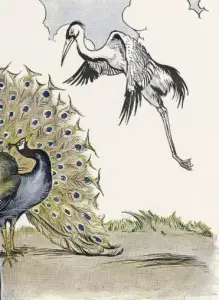The Peacock and the Crane (from the Fables of Aesop)

Քու բերանդ քեզ չի գովէ,
Թո՛ղ ուրիշը քեզ մեծցնէ։
Սիրամարգը մէկ օր մը առատապէս
Սիրամարգը օրինակ է հպարտ փառասէրին որ կարծէ թէ իրմէ վեր մարդ չկայ. բայց չգիտեր թէ ուրիշին քով ի՞նչ բաներ կան որ ինքը չունի։
The Peacock and the Crane by chance met together in the same place. The Peacock erecting his tail, displayed his gaudy plumes, and looked with contempt upon the Crane, as some mean ordinary person. The Crane, resolving to mortify his insolence, took occasion to say, that Peacocks were very fine birds indeed, if fine feathers could make them so; but that he thought it a much nobler thing to be able to rise above the clouds, than to strut about upon the ground, and be gazed at by children.
It is very absurd to slight or insult another upon his wanting a property which we possess; for he may, for any thing we know, have as just reason to triumph over us, by being master of some good quality of which we are incapable. But, in regard to the fable before us, that which the Peacock values himself upon, the glitter and finery of dress, is one of the most trifling considerations in nature; and what a man of sense would be ashamed to reckon even as the least part of merit. Indeed, children, and those people who think much about the same pitch with them, are apt to be taken with varnish and tinsel: but they who examine by the scale of common sense must find something of weight and substance, before they can be persuaded to set a value. The mind which is stored with virtuous and rational sentiments, and the behaviour which speaks complacence and humility, stamps an estimate upon the possessor, which all judicious spectators are ready to admire and acknowledge. But if there be any merit in an embroidered coat, a brocade waistcoat, a shoe, a stocking, or a sword-knot, the person who wears them has the least claim to it; let it be ascribed where it justly belongs—to the several artisans who wrought and disposed the materials of which they consist. This moral is not intended to derogate any thing from the magnificence of fine clothes and rich equipages, which, as times and circumstances require, may be used with decency and propriety enough: but one cannot help being concerned, lest any worth should be affixed to them more than their own intrinsic value.


Comments
Post a Comment